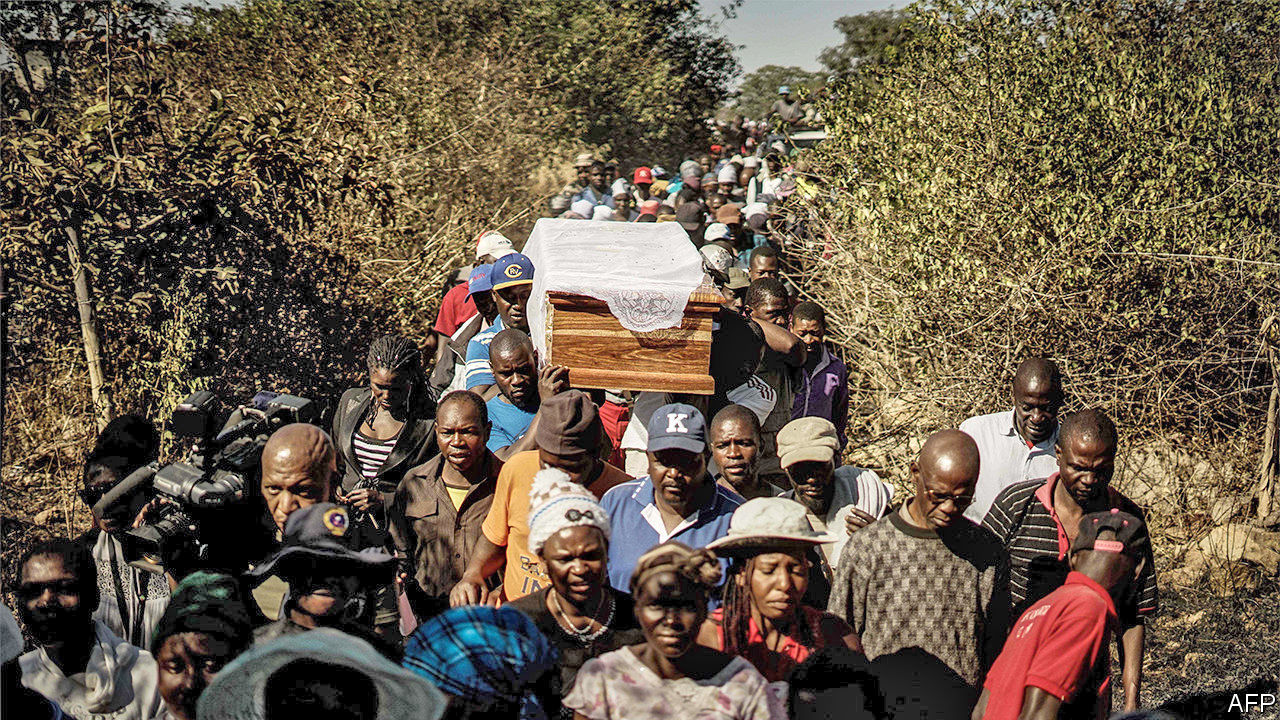

After holding peaceful elections on July 30th Zimbabwe has again descended into violence. At least six people were killed on the streets of the capital two days after the vote. Since then human-rights groups have recorded more than 150 alleged cases of abuse against opposition supporters (including that of the husband and wife above), most seemingly at the hands of soldiers. The true figure is almost certainly many times higher. Hundreds of MDC members have fled their homes, including Tendai Biti, one of the bloc’s senior figures, whose claim for asylum in Zambia was rejected on August 8th.
For some the violence is not just grim, but odd. Since taking power via a coup last November, President Emmerson Mnangagwa has sought to convince the world that Zimbabwe is “open for business” following nearly four decades of misrule by Robert Mugabe. The culmination of this plan was meant to be a convincing victory in the election, which even if neither free nor fair, would be orderly enough to win him the blessing of foreign governments. They would then encourage creditors to lend the country much-needed foreign currency. Instead there is mayhem. When not shooting civilians in the back, Zimbabwe’s ruling elite seems to be shooting itself in the foot.
Zanu-PF, the party of Mr Mnangagwa, has a history of thuggery. Mr Mugabe once boasted: “We have degrees in violence.” But the recent brutality is probably made worse by the fact that the ruling elite is far from united. Both Zanu-PF and the myriad security forces are fragmented. So while some factions may lose from chaos, others believe they will gain. So goes the macabre struggle for power and spoils.
In his election campaign Mr Mnangagwa tried to portray himself as an all-powerful leader. But his control over his own party remains fragile. The so-called G40 faction, associated with Grace Mugabe, Robert’s second wife, remains influential, well funded and keen for Mr Mnangagwa to fail. At the local level it has been hard for the president to exert authority. There were two dozen riots during the primary elections for Zanu-PF candidates. Some newly elected members of parliament, such as Webster Shamu, have repeatedly clashed with Mr Mnangagwa. Overall only about a quarter of new members are incumbents. No one knows how the newcomers will wield their power.
Neither is there unity between the armed forces and Zanu-PF, nor among the men in uniform themselves. The agitator-in-chief, according to several sources, is Constantino Chiwenga, the vice-president and minister of defence, who is rumoured to want one day to replace Mr Mnangagwa. The former commander of the Zimbabwe Defence Forces (ZDF) played a pivotal role in the coup last year, but has struggled to adapt to political life. (He tried to fire thousands of striking nurses before realising that was not possible.) It is he, rather than the current head of the ZDF, Philip Sibanda, who is believed to have instigated the crackdown on August 1st, out of frustration that others have been too soft on the MDC. Mr Chiwenga speculates that his critics are high on weed.
The president may be weaker than many assume, but he is not innocent. Mr Mnangagwa reportedly co-ordinated the post-election violence in 2008-09. It is implausible to claim, as his allies do, that he knows little of what is happening now.
The MDC is challenging the legality of Mr Mnangagwa’s first-round win in the presidential race on July 30th. But given the partisanship of Zimbabwe’s judges, defeat looks certain. Therefore Mr Mnangagwa will be sworn in again as president before the end of the month. He will do so amid growing mistrust among foreign governments and would-be investors. And with more blood on his hands.


